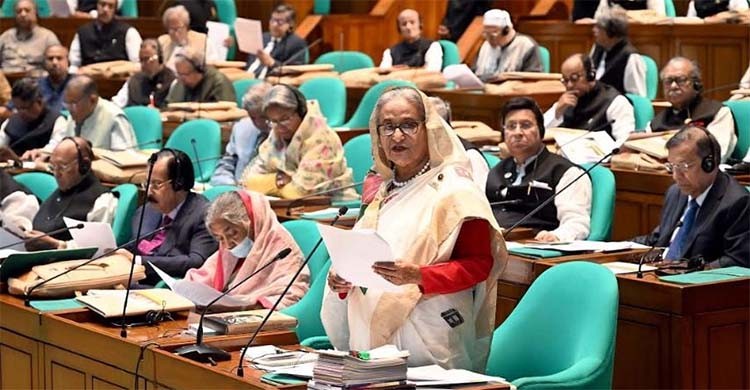PM sees stable parliamentary democracy behind massive development
07 April 2023, 09:17 pm | Updated: 05 April 2025, 04:09 am

Prime Minister Sheikh Hasina today told parliament that Bangladesh has witnessed massive development because of the consistency of parliamentary democracy and a stable political environment since 2008.
"In line with the constitution during the last three terms - (from) 2008, 2014 and 2018, the continuous progress of the Bangladesh Jatiya Sangsad, the consistency of parliamentary democracy and political stability have created a scope for massive development of Bangladesh," she said.
Sheikh Hasina, also the Leader of the House, said this while placing a motion in the House on the occasion of the Golden Jubilee of Bangladesh National Parliament.
In continuation of the scope, she said, Bangladesh achieved many successes like the successful implementation of Millennium Development Goals (MDGs), reducing the poverty rate to 18 percent from 40 percent, gradual sustainable development of Bangladesh, the graduation of Bangladesh into the club of the developing countries, reaching electricity to cent percent houses, massive development of communication infrastructures, attainment of food autarky, construction of Padma Bridge with own finance, implementation of Metrorail project, launching Bangabandhu Satellite, setting up Rooppur Nuclear Power Plant, rehabilitation of landless and homeless people under Ashrayan project, women empowerment, construction of Birnibash (houses) for freedom fighters and building Digital Bangladesh.
"Overall, today Bangladesh is a wonder of the world for the development of the people's life," she added.
Sheikh Hasina, Member of Parliament from Gopalganj-3 constituency, moved the motion under the Section-147 of the Rules of Procedure in the House on the 50th anniversary day of Bangladesh National Parliament.
The Prime Minister in her motion said: "During the auspicious moment of 50 years of the Bangladesh Jatiya Sangsad, the Parliament is in opinion that the Bangladesh Jatiya Sangsad as the centre of parliamentary democracy will continue to play an effective and active role in the development of people's life standard and the successful implementation of their hopes and aspirations, and thus democracy will be strengthened, an exploitation-free social system will be established, equality and justice will be guaranteed for all, we all will work together to fulfill these promises stated in the constitution, and build a happy, prosperous, advanced, hunger- and poverty-free smart Bangladesh and the Sonar Bangla as dreamt by Bangabandhu Sheikh Mujibur Rahman-- this should be our conviction."
Earlier, President Md. Abdul Hamid addressed the House on the occasion of the 50 years of the Bangladesh National Parliament.
On April 07, 1973, the first parliament had gone into the maiden sitting in independent Bangladesh.
Mentioning that Father of the Nation Bangabandhu Sheikh Mujibur Rahman has given this occasion to the nation, the Prime Minister said that he (Bangabandhu) has endured sufferings and sacrificed throughout his entire life for the welfare of the people of Bangladesh.
Referring to the time-frame of Bangabandhu for building the country, she said that Father of the Nation had got only three years, seven months and three days, and during the period he had played the most effective role in the history of the country.
Sheikh Hasina said that Bangabandhu has adopted the four fundamental principles of the Constitution, which are nationalism, democracy, socialism and secularism, and he stated all the basic rights of everyone from the backward people of society in the Constitution on the basis of these principles.
During the short regime, she said, promulgation of 462 laws, ordinances and orders was an extraordinary task of Bangabandhu.
"When I think about it, I wonder how he could do so much work in this short period of time!" she said, adding that, on the one hand, he has rebuilt the war-torn country and, on the other hand, he has demonstrated a great example of establishing the rights of the people of this country by consolidating democracy.
During the regime of three years and seven months of Bangabandhu, Sheikh Hasina said, Bangladesh had received the acknowledgment of 123 countries alongside attaining membership in different international organisations.
In addition, the United Nations also gave the status of Least Developed Countries to Bangladesh, she said, adding "This journey wasn't so easy for the country, but he (Bangabandhu) had to attain all those overcoming a lot of hurdles."
She continued that Bangabandhu has left a rare example before all of us of how a country could be rapidly rehabilitated, reconstructed and developed, if there is a will.
"And if Bangabandhu was alive, Bangladesh would have become a developed country much before," she observed.
Sheikh Hasina said that they follow the ideals of Bangabandhu and that is why, since 2008, democracy has continued in the country, resulting in the prevalence of stability here.
"Sometimes obstacles come, but overcoming those we are pulling the country toward progress," she said.
Referring to attaining the status of a developing nation, the Prime Minister said "In that continuity we will make Bangladesh a smart nation and, golden Bangla by 2041 as dreamt by Bangabandhu."
She said that today Bangladesh is a role model in the world for poverty alleviation, facing disasters, women empowerment, reducing child and maternal mortality rates and development.
Talking about the golden jubilee of the Parliament, the Premier said the National Parliament witnessed many historic incidents in its 50-year journey. "The centre of parliamentary democracy - the National Parliament- has been playing a role in the progress of democracy amid different hurdles," she said.
"This National Parliament is playing a significant role in the establishment of the rule of law by ensuring the transparency and accountability of the government," she added.






















